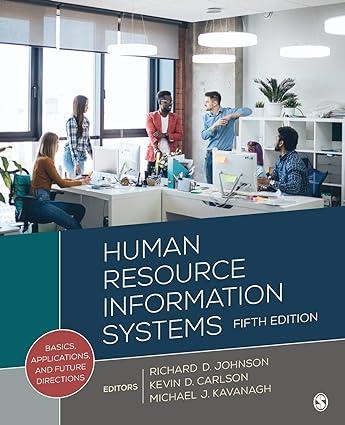Straton Industries is a Connecticut-based manufacturer of molds, tools, dies, and stampings. As a machine shop, they
Question:
Straton Industries is a Connecticut-based manufacturer of molds, tools, dies, and stampings. As a machine shop, they help other companies with any of their custom manufacturing needs.
Founded in 1961, the firm has built its reputation by providing superb customer service and ensuring that everything they do is of the highest quality. It’s difficult to find an industry that Straton Industries has not served—aerospace, electronics, energy, military, medical, and much more. With fewer than 100 employees, providing this high level of service shows that small companies can effectively thrive in the machining industry.(1)
However, small companies are notorious for not having a human resources department. This is a role that is common in large, diversified companies with hundreds, if not thousands, of employees. Entire departments may have 20 or more individuals dedicated to the HR function. But with a small business, it is typically the owner or one of the vice presidents who take on the HR duties. This means they are often not trained and do not have the expertise to properly manage staffing, training, employee relations, compensation, benefits, safety, and more. Fortunately, the president of Straton Industries, David Cremin, recognized the need for a person to be dedicated to the HR role in his company.(2)
By hiring Donna Toth to manage the growing company’s HR needs, it gave Cremin time to focus on managing the business. Cremin knew HR was important, but overseeing every aspect of the firm meant that HR concerns were usually farther down on his list of things to do each day. Cremin was primarily focused on the growth of the company—ensuring that sales were increasing and that the firm was garnering new customers.
But turnover started to become an issue when some employees started leaving the company. “We missed the cues,” he said, referring to the departure of several employees.(3) Toth was hired when Cremin realized too many employees were quitting the company because they were dissatisfied with their employment situation. A person dedicated to the HR function of the firm was needed.
Toth was able to hit the ground running by bringing Straton Industries’ HR function up to date. She started with simple steps, such as writing job descriptions and facilitating improved communication. Then, she worked on staffing and team building. With these actions, Toth impacted the internal operations of the company immediately. According to Cremin, “You think of it as just ‘people stuff,’ as something soft and optional you can take care of in between other things.”(4)
Fortunately, Cremin realized that HR was more than just
“people stuff”; human resources are the key to the success of a business.
Primarily, Toth is focused on three aspects of HR that are important to Straton Industries. Daily, she is ensuring the firm is hiring the right people, retaining those individuals, and ensuring the firm is complying with all federal and state HR laws. Of course, she is also managing all the other HR functions in the company, but by dedicating efforts to these three areas, Cremin can return his attention to growing the company and garnering new clients.
What is his advice for small companies that don’t have an HR professional on staff? “Try it part time,” he says. Having an individual focused on human resources issues even part time is better than none at all.(5)
Questions 1. Why should businesses—no matter how small—have someone dedicated to the HR function?
2. T hink of two ways a small business could justify hiring an HR professional.
3. How effective would Straton Industries be without Donna Toth as their HR professional? What potential concerns might develop?
4. A s Straton Industries grows, should an additional HR professional be hired to help Donna Toth? And if so, what should that new person be focused on?
Step by Step Answer:

Human Resource Information Systems
ISBN: 9781544396743
5th Edition
Authors: Richard D. Johnson, Kevin D. Carlson, Michael J. Kavanagh





